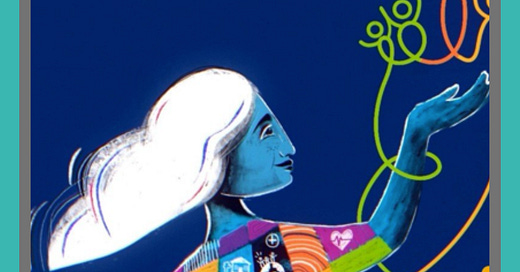Health is not a state of complete well-being, it is a process
Today, on World Health Day, I suggest a new definition of health, in which we stop judging each other for simply being normal human beings.
Today is World Health Day, a day founded by the World Health Organization (WHO), who on their website encourages us to see the day as ”an opportunity to motivate action to tackle the health challenges of today ̶ and tomorrow.” Great initiative! I would like to suggest we start with re-evaluating way we, and the WHO, define health.
The WHO´s definition of health is:
‘A state of complete physical, mental and social well-being and not merely the absence of disease or infirmity’[1]
I like that the WHO recognises that physical, mental and social elements are all parts of our health and that well-being is not the same as absence of disease. However, I do not like their view of health as a "complete state of well-being". Personally, I don´t think I have ever been in a complete state of well-being. There is always something troubling me – in my body or in my mind. It could be a small back ache or a worrying thought or it can be something bigger and more serious challenges with my body, mind or relationships. I do not think that makes me unhealthy – it just makes me human. As with all things in life, our health and well-being are continually changing. Struggling, feeling discomfort or pain is part of life and completely normal. I believe it is our ability to thrive throughout the ups and downs of life, and with the pleasures and pains, that truly defines us as being healthy and alive. My book, Ageing Upwards, is an invitation to take a less dichotomous approach to ageing and health. People are not either young or old, healthy or unhealthy, able or disabled, victims or perpetrators of ageism. We are all a mix of all of these. We are never perfect – nor should we strive to be.
The constant striving creates unnecessary suffering and I believe it actually impairs our health. The phrase “to be in a complete state of well-being” springs out of and exaggerate another cultural belief, which we would benefit from reconsidering as society and as individuals; the belief that we need to be perfect and that health and well-being comes through hard work, discomfort and even pain. We work-out to get fit, we say no to cake to lose weight, we go through therapy to cope with trauma. And yes, those are all very valid, recommendable, and necessary ways to create good healthy lives. BUT there is a limit to how much we can do to our bodies and minds. Some things in life simply cannot be changed. We will never be in a perfect state of health, no matter how hard we work for it. Sometimes we need to meet our less-abled bodies and minds with acceptance and self-compassion.
This cultural unattainable narrative of what it takes to be healthy gives us guilt. Lots of guilt! When we are not able live up to this ideal state of a healthy human being, we feel like we become a burden to society. We see ourselves as failures, when we are not able to “age successfully” for instance. We feel broken and wrong. We get overwhelmed by shame and blame ourselves. Our agist culture is judging us for simply being human beings that naturally age and experience physical and mental ups and downs.
Let me be clear, I am not saying that we should not make an effort, physically, socially and mentally, to live healthy lives. We need to act, of course, to be able to adapt to life as our situation, body and mind changes. We need to select new goals, optimize old or new resources and often we also need to find ways to compensate. It requires an active and flexible body and mind. But here is what I have discovered; it is not the stick that helps us thrive. By the age of 50, most people have pushed, punished, and shamed themselves for years for not being good enough. It is about time we allow ourselves to be motivated intrinsically by the things that is important to us, not because of other people´s judgements. It is a lot harder for me to exercise if I do so because people around me tell me to, than if I do it for reasons that matters to me. It could be simply to feel good, to live long enough to see my grandchildren grow older or something else that matters to me.
My suggestion to a new definition of health would be something along the lines of:
“Not merely the absence of disease or infirmity, but a continuous process of adapting to the natural physical, psychological and social ups- and downs of life with resilience, compassion and acceptance”.
Pains and sufferings are part of being human. It is not something to avoid or feel shameful about. If we really want to tackle the health challenges of today, we need to stop judging each other for simply being normal human beings.
[1] Constitution, World Health Organization. Available from: www.
who.int/about/governance/constitution




